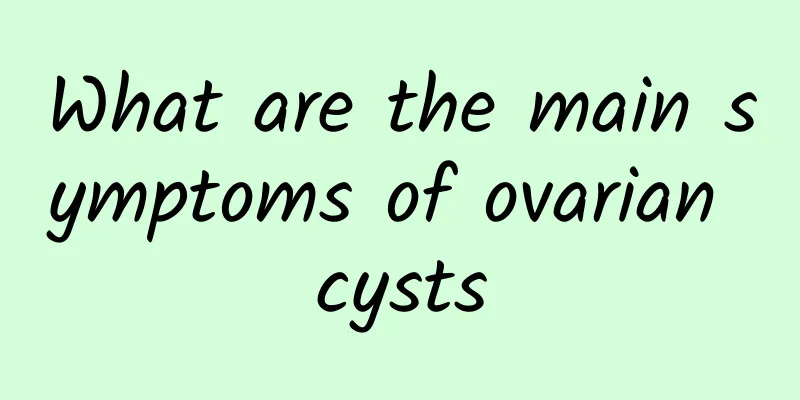What are the main symptoms of ovarian cysts

|
What are the symptoms of ovarian cysts? Where do ovarian cysts usually appear? Where do patients with ovarian cysts usually feel pain? Ovarian cysts seriously affect people's lives, so people must pay attention to them. Let the experts introduce us to the symptoms of ovarian cysts. What are the main symptoms of ovarian cysts? Ovarian cysts have no obvious symptoms in the early stage, and patients are often found during gynecological examinations when they seek medical treatment for other diseases. Later, as the tumor grows, the patient will feel it. The symptoms and signs vary depending on the nature, size, development, and presence or absence of secondary degeneration or complications of the tumor. The main symptoms of ovarian cysts are as follows: 1. Lower abdominal discomfort is the initial symptom before the patient feels a lower abdominal mass. Due to the weight of the tumor itself and the influence of intestinal peristalsis and body position changes, the tumor moves in the pelvic cavity, pulling on its pedicle and pelvic funnel ligament, causing the patient to feel fullness and falling in the lower abdomen or iliac fossa. 2. Increased abdominal circumference and abdominal mass are the most common complaints. The patient feels that his clothes or belt seem too tight, and then notices the enlargement of the abdomen, or feels it by chance in the morning, so he presses his abdomen and finds a mass in the abdomen, plus abdominal distension and discomfort. 3. Abdominal pain If the tumor has no complications, there is very little pain. Therefore, if patients with ovarian tumors feel abdominal pain, especially if it occurs suddenly, it is mostly caused by the torsion of the tumor pedicle, or occasionally by tumor rupture, bleeding or infection. In addition, malignant cysts often cause abdominal pain and leg pain, and the pain often causes patients to seek emergency treatment. 4. Menstrual disorders Ovarian cysts, even bilateral ovarian cysts, usually do not cause menstrual disorders because they do not destroy all normal ovarian tissues. Some uterine bleeding is not endocrine, but may be caused by ovarian tumors that change the pelvic blood vessels, causing endometrial congestion; or by ovarian malignant tumors that directly metastasize to the endometrium. Menstrual disorders caused by endocrine tumors are often combined with other secretory effects. 5. Compression symptoms: Huge ovarian tumors can cause dyspnea and palpitations due to compression of the diaphragm. Ovarian tumors combined with a large amount of ascites can also cause such symptoms. However, the dyspnea of some ovarian tumor patients is caused by unilateral or bilateral pleural effusion, and is often combined with ascites, forming the so-called Meigs syndrome. The above are the symptoms of ovarian cysts introduced by experts. I hope everyone can pay attention to them. If you find yourself experiencing the above symptoms in your daily life, then you may have ovarian cysts. For your health, the best way is to get checked and treated. Ovarian cysts http://www..com.cn/fuke/ncnn/ |
<<: Beware of fibroids if your menstrual period is too long
>>: Clinical symptoms of ovarian tumors
Recommend
Vegan champion athletes share their experiences and the “power of veganism”: being a vegetarian can be healthy!
Many people have misconceptions about vegetariani...
What causes irregular menstruation? Is irregular menstruation related to smoking?
Irregular menstruation not only threatens everyon...
What are the better care methods for bacterial vaginosis?
Many diseases need care to get better quickly, es...
You read that right! Cauliflower can also be used to make low-sugar desserts, 3 dream recipes revealed
If you make your own snacks, you can adjust the a...
Can I induce labor at six months of pregnancy?
Now many people will choose to have surgery as so...
What Chinese medicine can treat pelvic peritonitis?
In the treatment of chronic pelvic peritonitis, s...
What are the symptoms of cervical erosion that often occur in women?
It is common for women to suffer from cervical er...
Never lose weight alone! Sisters are powerful, Vivian Hsu shares hilarious weight loss tips
Vivian Hsu shared her recent weight loss tips, wh...
What should I do if I have abdominal pain and back pain after miscarriage?
What should I do if I have abdominal pain and bac...
Threatened abortion without bleeding test
For many pregnant mothers, threatened miscarriage...
What tests should be done for endometriosis?
Endometriosis is a common gynecological disease t...
What are the causes of irregular menstruation? Is irregular menstruation related to medication?
Hormone imbalance: Hormone imbalance is the main ...
What should I do if my period is yellow and has no blood on the first day?
What should I do if my period is yellow and has n...
Do you know the cause of dysmenorrhea?
Does your child suffer from excruciating pain eve...
Can patients with adenomyosis eat shrimp?
Patients with adenomyosis can generally eat shrim...









